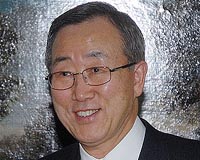 |
Moscow (AFP) Jan 26, 2011 Russia's upper house of parliament ratified the new US nuclear disarmament treaty Wednesday, the final step in approving the first nuclear pact between the two former Cold War rivals in 20 years. Senators at the Federation Council voted unanimously to approve the new START treaty, which US President Barack Obama and his Russian counterpart Dmitry Medvedev signed in Prague on April 8, 2010. The new Strategic Arms Reductions Treaty (START) reduces old warhead ceilings by 30 percent and limits each side to 700 deployed long-range missiles and heavy bombers. Russia's State Duma lower house of parliament backed the measure in the third and final reading on Tuesday and the US Senate ratified the pact after a months-long debate on December 22. NATO Secretary General Anders Fogh Rasmussen hailed the vote as "good news for international security and stability." His message was backed by Mikhail Margelov, the Federation Council's international affairs committee chief who was one of the pact's principal backers in Russia. "The START agreement verifies the trust between the two sides," he said after the vote. The original 1991 START agreement expired at the end of 2009 amid differences in readings of what constituted 21st century threats. Those differences also remained throughout the tortuous negotiating and approval process, with both the Senate and Russia's parliament adopting a series of non-binding amendments that put their own spin on the new pact. One of the most fundamental disagreements concerns a US decision to pursue a European missile defence shield that Russia had spent years resisting. Moscow has since modified its stance, saying that it was ready to see the shield go up, but only if it was giving an equal say in how it operates -- and in determining which nations posed a real threat to the West. Obama and NATO have responded with extreme caution, noting that a joint system would require an unprecedented level of data and intelligence sharing and overcoming various technological stumbling blocks. Moscow and Washington held a new round of missile defence talks last week, but those meetings ended with Medvedev reaffirming that Russia would be forced to deploy more nuclear weapons if it was left out of the shield. Defence Minister Anatoly Serdyukov expanded on that message on Wednesday, telling Russia's senators that the country would be forced to deploy its own missile systems if its stance was ignored by the West. "As far as our own ballistic missile defences are concerned, we are continuing to develop them just as we had done in the past," Serdyukov said. Although there has been little compromise on missile defences since NATO and Russia held a historic summit in November, both sides appear ready to engage in more talks. Rasmussen said he hoped that START's ratification "will help Allies and Russia to make concrete progress in their strategic partnership, including in the field of missile defence." A top Russian foreign ministry official responded that Moscow was "ready to have substantive talks with all our partners." The treaty's passage in Moscow has been accompanied by repeated Russian vows to make a more modern and effective force out of the country's Soviet-era arsenal. On Wednesday, the director of a Moscow institute that makes the new long-range Bulava missile said Russia was preparing to dramatically boost production in the coming years. "We have two years ... to prepare ourselves for a manifold boost in the production (of missile) parts," Yury Solomonov, head of the Moscow Institute of Thermal Technology, told Interfax-AVN. The new START will enter into force the moment the two presidents swap their respective "instruments of ratification," which is expected to happen within days.
Share This Article With Planet Earth
Related Links Learn about nuclear weapons doctrine and defense at SpaceWar.com Learn about missile defense at SpaceWar.com All about missiles at SpaceWar.com Learn about the Superpowers of the 21st Century at SpaceWar.com
 Arms talks deadlock increases nuclear threat: UN chief
Arms talks deadlock increases nuclear threat: UN chiefGeneva (AFP) Jan 26, 2011 UN chief Ban Ki-moon warned on Tuesday that the deadlock in global nuclear arms control talks in Geneva threatens international security by increasing the risk that weapons might fall into the wrong hands. His comments came day after Pakistan reiterated its lone public opposition to starting talks in the Conference on Disarmament on a ban on the production of new nuclear bomb-making material ... read more |
|
| The content herein, unless otherwise known to be public domain, are Copyright 1995-2010 - SpaceDaily. AFP and UPI Wire Stories are copyright Agence France-Presse and United Press International. ESA Portal Reports are copyright European Space Agency. All NASA sourced material is public domain. Additional copyrights may apply in whole or part to other bona fide parties. Advertising does not imply endorsement,agreement or approval of any opinions, statements or information provided by SpaceDaily on any Web page published or hosted by SpaceDaily. Privacy Statement |